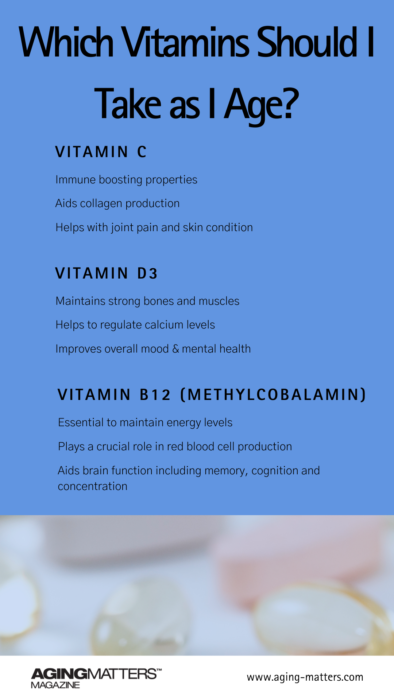
Which Vitamins Should I Take as I Age?
October 25th, 2023As we get older, our nutritional needs change. This is because our bodies undergo natural changes, such as decreased metabolism and reduced absorption of nutrients.
To maintain good health as we age, it’s important to eat a balanced diet that fulfils our body’s needs. But sometimes, getting all the required vitamins and minerals from our diet isn’t possible. This is where supplements come in.
But which vitamins should you take as you age? There are some essential vitamins you can research and take to keep your body happy and healthy.
Vitamin C: The Immune System Booster
Vitamin C is one of the most well-known and widely used vitamins. It’s known for its immune system-enhancing properties, helping to protect your body against infections and illnesses.
Not only does it help boost our immune system, but vitamin C also aids in producing collagen, an essential protein for maintaining healthy skin, bones, and connective tissues. This can help reduce the risk of common age-related health issues such as osteoporosis and joint pain!
BoostPro™ is a high-strength Vitamin C supplement that contains Quercetin, an all-natural compound associated with longevity, immunity, and heart health – making it a great choice for older adults looking to maintain their overall well-being.
Vitamin D3: The Sunshine Vitamin
Vitamin D3, the ‘sunshine vitamin,’ is another essential nutrient for older adults. As we age, our body’s ability to absorb vitamin D decreases, making it harder to get enough through natural sources such as sunlight and food.
But why is vitamin D3 so important? Well, it plays a crucial role in maintaining strong bones and muscles, which are vital for mobility and preventing falls.
It also helps regulate calcium levels in the body, which can help reduce the risk of hypocalcemia. Moreover, vitamin D3 has improved overall mood and mental health. Studies have shown that it can help reduce symptoms of depression and Seasonal Affective Disorder (SAD).
Vitamin B12 (Methylcobalamin): The Energizing Nutrient
Vitamin B12, also known as Methylcobalamin, is essential for maintaining energy levels and promoting overall health. It plays a crucial role in the production of red blood cells, which carry oxygen to our cells and tissues, keeping them energized.
Without enough vitamin B12, we may experience fatigue, weakness, and even numbness or tingling in our hands and feet. It also plays a significant role in brain function, promoting concentration, memory, and cognitive function. Additionally, vitamin B12 is beneficial for good mental health and mood regulation.
Multivitamin Supplements: A Convenient Solution
A multivitamin is a simple solution for older adults who may have difficulty getting the necessary nutrients from their diet alone.
Multivitamin supplements typically contain lower amounts of vitamins and minerals, which work together to support our health and well-being. This makes it easier for our bodies to absorb and utilize the nutrients efficiently.
Multivitamin supplements often include vitamins C, E, B2, B3, B5, B6, B1, folic acid, manganese, potassium, and iron. These vitamins help maintain a healthy immune system, promote energy production, regulate mood and cognitive function, support bone health, and much more.
Liposomal Vitamins vs Regular Vitamins
Liposomal vitamins are a newer form of vitamin supplements that have been gaining popularity. They are essential vitamins encapsulated in tiny fat bubbles called liposomes, which protect the vitamins as they go through our digestive system. This allows the vitamins to be absorbed more efficiently and effectively than traditional oral vitamins.
That said, liposomal and regular vitamins have their own benefits. They both provide essential nutrients for our bodies, but liposomal vitamins may offer better absorption rates. Regular vitamins, on the other hand, are usually more affordable and readily available.
Ultimately, deciding between liposomal and regular vitamins depends on individual needs and preferences. And remember, you should always seek medical advice if you or a loved one have any health concerns.
Conclusion
Vitamins, whether oral or liposomal, are crucial for maintaining our health and well-being. They work together to support various bodily functions and help us age slower. While liposomal vitamins may offer better absorption, regular vitamins still have their own benefits.
Whichever option you choose, it’s important to prioritize getting enough essential vitamins and nutrients to keep your body functioning at its best. Remember, a healthy diet supplemented with vitamins can help us live our best lives as we age!






